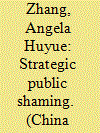| Srl | Item |
| 1 |
ID:
101070


|
|
|
|
|
| Publication |
2010.
|
| Summary/Abstract |
A patent right provides the first and foremost form of protection for inventions. Patent regimes exist in almost every country. Despite convergence specially pushed through TRIPS, there are still important differences between these regimes. Lesser forms of patent protection for inventions, namely, utility models or short term or petty patents, constitute one of these fundamental differences. This article examines the pros and cons of these systems and comes up with the argument that such rights are necessary to foster innovation in a capitalist economy. The article further asserts that such utility models may serve to remedy the shortcomings of the patent system, provided that they are enforced within a legal structure conducive to innovation, i.e. complemented with certain restrictions envisaged in the relevant intellectual property legislation and conditioned by effective enforcement of antitrust laws.
|
|
|
|
|
|
|
|
|
|
|
|
|
|
|
|
| 2 |
ID:
086954


|
|
|
|
|
| Publication |
2009.
|
| Summary/Abstract |
The Quanta judgement clarifies the US patent exhaustion doctrine on the basis of an authorized sale by the patent holder. It also contributes to the prism of patent-antitrust-contract laws to scrutinize contractual restrictions better on downstream purchasers. There are two main steps in the process of applying this prism. The first step is to determine the patent exhaustion issue. The second step is to evaluate such contractual restrictions through either the intersection of patent and antitrust laws or the intersection of contract and antitrust laws, or both intersections in some special cases. The correctness of determining both whether patent exhaustion is triggered and how antitrust law intervenes as a second filter plays a very important role in applying the Quanta-inspired prism. Through this prism, some Federal Circuit's decisions are re-visited, and the European Union perspective is analyzed in comparison with the US perspective. This article concludes that patent holders' contractual restrictions on downstream purchasers will be properly scrutinized under the prism of patent-antitrust-contract laws if promoting innovation and competition on the market as well as protecting customer welfare are respected.
|
|
|
|
|
|
|
|
|
|
|
|
|
|
|
|
| 3 |
ID:
177329


|
|
|
|
|
| Summary/Abstract |
Spanish premium oil operators have been accused of coordinating gasoline price cuts on Mondays. The objective of this practice, known as the “Monday effect” was to lower the official prices of automotive fuels - that was collected on Mondays - so as Spain was not at the top of the European price ranking. This behavior presumably ceased in May 2013 when Government began to consider the average prices of the entire week instead of Mondays prices. In order to test whether this anticompetitive behavior existed and ceased after the change in the data collection methodology, we employ a novel database that includes retail prices for all petrol stations in Spain in the period 2012–2013. Using a difference-in-difference estimator, we exploit this regulatory change to econometrically identify and confirm that: i) the three main companies, with 70% of the market share, have systematically established lower prices on Mondays, and that this is unjustified by either cost or demand; ii) this price reduction was small during 2012, but increased significantly in the first half of 2013. iii) following the change in the collection of price data by the government, the average Monday effect ‘disappeared’ from the Spanish gasoline market. Our results highlight the price coordination capacity of dominant oil operators in Spain and suggest that authorities that monitor cartels should be much more active in promoting competition in this sector, for example, by facilitating the entry of low-cost or independent stations and/or by being particularly alert to evidence of collusive behavior. Likewise, this coordination capacity must be taken into account when evaluating mergers in this sector and/or imposing fines.
|
|
|
|
|
|
|
|
|
|
|
|
|
|
|
|
| 4 |
ID:
164417


|
|
|
|
|
| Summary/Abstract |
This article examines strategic public shaming, a novel form of regulatory tactics employed by the National Development and Reform Commission (NDRC) during its enforcement of the Anti-Monopoly Law. Based on analysis of media coverage and interview findings, the study finds that the way that the NDRC disclosed its investigation is highly strategic depending on the firm's co-operative attitude towards the investigation. Event studies further show that the NDRC's proactive disclosure resulted in significantly negative abnormal returns of the stock prices of the firm subject to the disclosure. For instance, Biostime, an infant-formula manufacturer investigated in 2013, experienced −22 per cent cumulative abnormal return in a three-day event window, resulting in a loss of market capitalization that is 27 times the antitrust fine that it ultimately received. The NDRC's strategic public shaming might therefore result in severe market sanctions that deter firms from defying the agency.
|
|
|
|
|
|
|
|
|
|
|
|
|
|
|
|